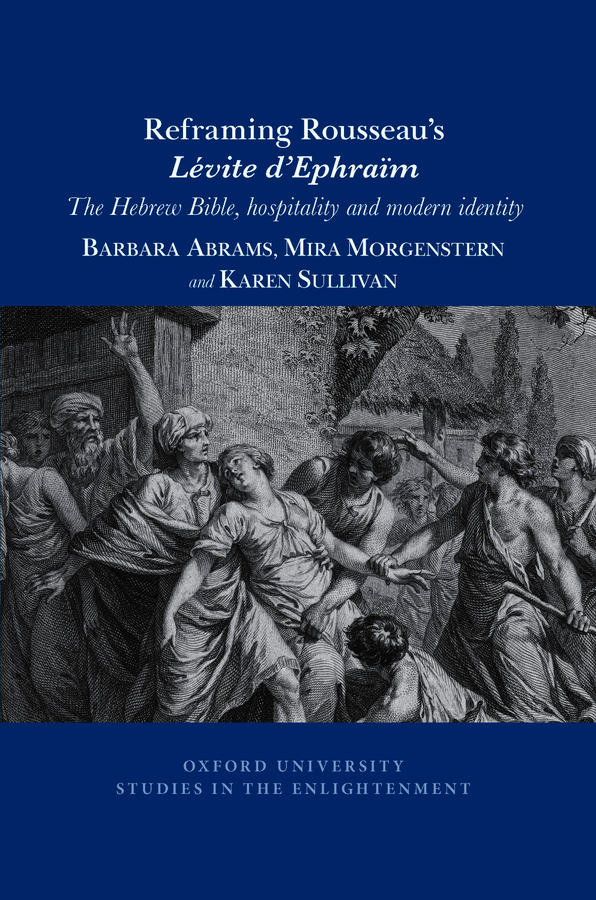
B. Abrams, M. Morgenstern, K. Sullivan, Reframing Rousseau’s Lévite d'Ephraïm: The Hebrew Bible, Hospitality, and Modern Identity
Barbara Abrams, Mira Morgenstern, and Karen Sullivan
Reframing Rousseau’s Lévite d'Ephraïm: The Hebrew Bible, Hospitality, and Modern Identity
Liverpool University Press
Oxford University Studies inthe Enlightenment, 2021
EAN13 : 9781800348134
256 p.
PRÉSENTATION
Le Lévite d’Ephraïm, Rousseau’s re-imagining of the final chapters of the Book of Judges, contains major themes of Rousseau’s oeuvre and lays forth central concerns of his intellectual projects. Among the themes highlighted in the concentrated narrative are: the nature of signs and symbols and their relationship to the individual and society that produce them; the role of hospitality in constituting civil society; the textually-displayed moral disorder as foreshadowing political revolution; and finally, the role of violence in creating a unified polity. In Le Lévite d’Ephraïm, Rousseau explores the psychological and communal implications of violence and, through them, the social and political context of society. The incarnation of violence on the bodies of the women in this story highlights the centrality of women in Rousseau’s thought. Women are systematically dismembered, both literally and figuratively, and this draws the reader’s attention to the significance of these women as they are perennially re-membered inside and outside the text. This study of these themes in Le Lévite d’Ephraïm places it in relation to the biblical text at its origins and to Rousseau’s own writings and larger cultural concerns as he grapples with the challenges of modernity.
“What can Enlightenment philosophes – especially Rousseau, arguably the most difficult of them all – have to tell us about modern life that we don’t already know? We are a team of scholars from different academic areas, each of whom offers a unique vantage point in understanding Rousseau’s texts. This constellation of approaches – grounded in an appreciation of the shared background of feminist critique promoted by the contributors to this volume – provides the density that allows Rousseau’s nuanced writings to be read in their full complexity.”
(Read the authors’ accompanying blog post)
SOMMAIRE
Foreword, Barbara Abrams, Mira Morgenstern, and Karen Sullivan
Acknowledgments
Abbreviations
Chapter 1: Rousseau and the Hebrew Bible: reading the Hebrew Bible in the eighteenth century, Mira Morgenstern
Brief summary of Rousseau’s Lévite d’Ephraïm, Barbara Abrams, Mira Morgenstern, and Karen Sullivan
Chapter 2: Crime and self-punishment: trauma, reading, and representation in Rousseau’s Lévite d’Ephraïm, Karen Sullivan
Chapter 3: Decoding hospitality: image and polity in Rousseau’s Lévite d’Ephraïm, Barbara Abrams
Chapter 4: Strangeness, violence, and the establishment of nationhood in Rousseau, Mira Morgenstern
Afterword: hospitality as an Enlightenment project, Mira Morgenstern
AUTRICES
Barbara Abrams is Director of the Global and Cultural Studies Program and Associate Professor of French and Women’s and Gender Studies at Suffolk University Boston. Her main field of interest is Eighteenth-Century French literature. Her current research includes the consignment of women to convents in Eighteenth-Century France.
Mira Morgenstern is Professor of Political Science in the Department of Political Science at the Colin Powell School of the City College of New York. She is currently at work on a study of the Social Contract entitled The Social Contract and the Politics of the Imagination.
Karen Sullivan is Associate Professor of French at Queens College/City University of New York. She has written a book on Rousseau’s aesthetics and articles on Rousseau, Graffigny and Gouges. Her forthcoming work on Rousseau explores Rousseau’s work through the lens of 20th-century trauma theory.